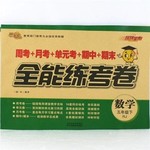题目内容
Many people think that teachers give pupils too much homework.They say that it is unnecessary for children to work at home in their free time.Moreover, they argue that most teachers do not1. (proper)plan the homework tasks they give to pupils.The result is that pupils have to repeat tasks that they2. (do)at school already.
In Greece,many parents complained about the difficult homework that teachers gave to their children.The parents said that most of the homework was 3. waste of time,and they wanted to stop it.Spain and Turkey are two countries4. stopped homework.In Denmark,Germany and several other 5. (country)in Europe,teachers cannot set homework at weekends.In Holland,teachers allow pupils 6. (stay)at school to do their homework.The children are free to help one another.Similar 7. (arrange)also exists in some British schools.
Most people agree that homework is not fair.A pupil doing his homework in a quiet and comfortable room is in a much 8. (good)position than a pupil who does his homework in a small,9. (noise)room with the television on.Some parents help their children with their homework.Other parents take no interest 10. their children’s homework at all.
1.properly
2.have done
3.a
4.which /that
5.countries
6.to stay
7.arrangement
8.better
9.noisy
10.in
【解析】
试题分析:如何减轻学生的作业负担可真是个麻烦事。人家外国人也碰上了这个问题。看看外国人又是怎么处理的?
1.1】此处plan 是动词,副词修饰动词,proper是形容词,所以要用它的副词形式properly。句意:多数的老师没有合适地安排作业任务。
2.2】根据句意结果是学生们不得不重复他们在学校已经做过的任务。用现在完成时态,故填have done。
3.3】习惯用语a waste of time 浪费时间。故填a 。句意:父母说多数的作业是浪费时间。
4.4】这是一个定语从句的考查,two countries 作先行词,后面是定语从句,从句没有引导词,却主语,故填which /that。句意:西班牙和土耳其是两个停止作业的国家。
5.5】several other 后面跟名词的复数形式,所以此处用country 的复数形式countries。几个其他的国家。
6.6】固定搭配allow sb. to do sth.允许某人做某事,故填to stay。
7.7】“相似的安排”,形容词修饰名词,arrange是动词,所以用它的形容词形式arrangement。
8.8】根据后面的than可知此处用比较级,故填good的比较级better。
9.9】“吵闹的房间”,形容词修饰名词,noise 的形容词是noisy,所以填noisy。
10.10】固定搭配take no interest in对---不感兴趣,故此处填in。
考点:考查社会现象类阅读。

 全能练考卷系列答案
全能练考卷系列答案As a boy, Sanders was much influenced(影响) by books about the sea, but by the age of fifteen he had decided to become a doctor rather than a sailor. His father was a doctor. So he was often with the doctors and got along very well with them. When he was fourteen, he was already hanging around the hospital where he was supposed to be helping to clean the medicine bottles, but was actually trying to listen to the doctors’ conversations with patients in the next room.
During the war Sanders served in the army as a surgeon(外科医生). “That was the happiest time of my life. I was dealing with real sufferers and on the whole making a success of my job.” In Rhodes he taught the country people simple facts about medicine. He saw himself as a life-saver. He had proved his skill to himself and had a firm belief that he could serve those who lived simply, and were dependent upon him. Thus, while in a position to tell them what to do he could feel he was serving them.
After the war, he married and set up a practice deep in the English countryside, working under an old doctor who hated the sight of blood. This gave the younger man plenty of opportunity(机会) to go on working as a life-saver.
1.When he was a small boy, books about the sea had made Sanders want to be ___.
A. a surgeon B. an army man
C. a sailor D. a life-saver
2.At the age of 14, Sanders ___.
A. worked as a doctor by cleaning the medicine bottles
B. met some doctors who were very friendly to him
C. was interested in talking with patients
D. remained together with the doctors
3.His experience in the Army proved that ___.
A. he was good at medical operations on the wounded
B. he succeeded in teaching people how to save their lives themselves
C. a doctor was the happiest man
D. his wish of being a life-saver could hardly come true
4.Having proved his skill to himself, Sanders ___.
A. wanted to live a simple life like a countryman
B. came to realize that he was really working for his countrymen
C. taught himself life-saving
D. was highly respected by the old doctor
5.When the war was over, he ___.
A. learned from an old doctor because he was popular
B. started to hate the sight of blood while working
C. served the countrymen under an old doctor who needed someone to help him
D. had few chances to be a “life-saver” because he was younger